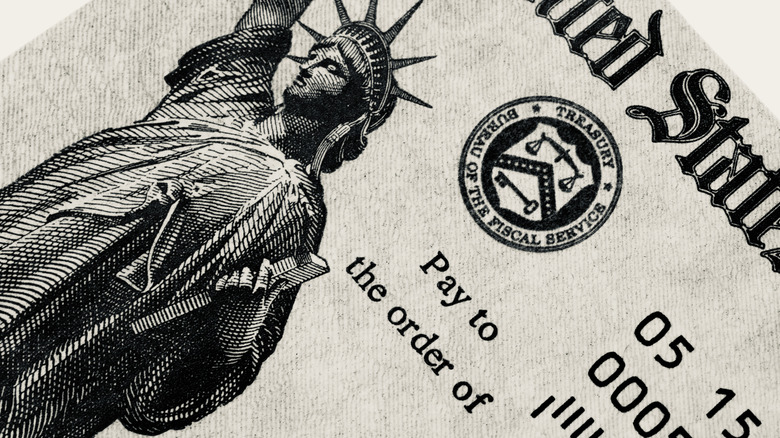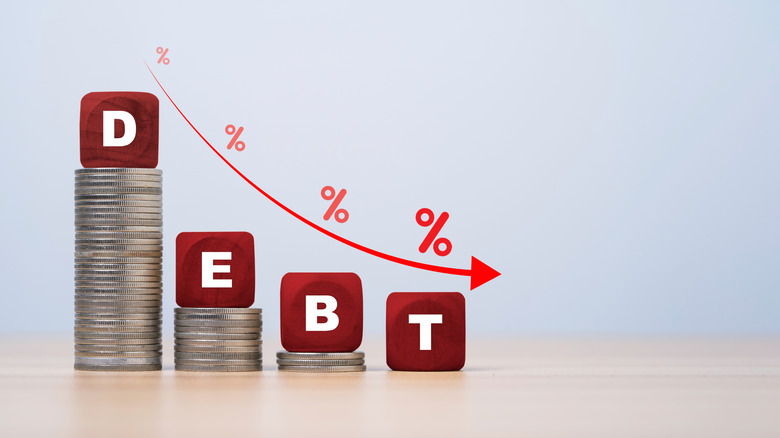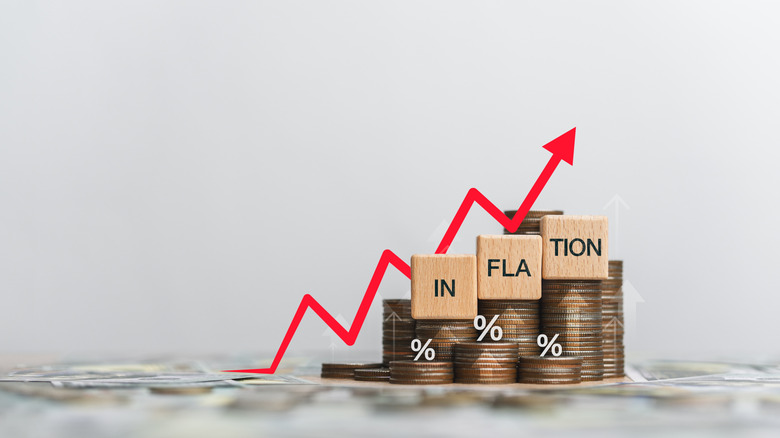11 Warning Signs You're Not Financially Ready To Retire
Retirement is a major life goal that so many Americans hold close. The envisioned cycle of life that most of us see in our mind involves working for decades to provide for our family and ourselves — ideally in a job that we like — and then sailing off into the sunset to enjoy our hobbies and time with loved ones more fully. Some people seek to retire as early as they can, perhaps even in their 30s. Following through on a strategy to leave the workforce, early or not, is at the center of any successful retirement, though. It takes years of planning and a carefully executed plan to make this happen. There are also numerous potential pitfalls along the way.
Life often makes a mess of even the best laid plans. You might be diligently saving for retirement only to become the victim of an accident on the road or elsewhere that leaves you with substantial medical debt or limits your earning capabilities. These kinds of events can make saving more difficult, throwing a wrench into the works as you continue to pursue the things you're involved with in life today while also setting money aside for later. Other, less intrusive problem areas can creep into the picture, creating vulnerabilities in your financial wellbeing that can threaten your retirement years in other ways. These are some of the most important warning signs that your retirement may need a little more planning and time to come to fruition.
Retirement is a worry
For a variety of reasons, you might be worrying about retirement as the transition approaches. You might feel a hesitancy to let go of your working life or you might be worried about the mental health effects that retirement brings into the picture. These are both valid reasons to be concerned over the big change and may even serve as quality reasons to stay working just a little while longer, beyond any financial considerations that may be present.
However, this concern might equally be grounded in a worry about how to pay for retirement. Thoughts about funding retirement might be the principal concern for a wider anxiety about this big shift. Either way, finding yourself consistently worrying about retirement is a gut feeling that you shouldn't ignore. Big changes often come with more than a few worries, and it's often exceedingly helpful to think them through before pulling the trigger on a major life decision. By sitting with these feelings for a while and exploring what has you concerned about the change, you may find that your hesitancy is overblown or that it's grounded in a real vulnerability that must be shored up before you can retire. Your gut isn't a scientific tool for making decisions, but intuition is a powerful psychological process that actually showcases scientific evidence as an important protective process in the human brain. Your gut isn't always right, but listening to what it says can lead you to better overall decision making.
You don't know where you stand financially
Not knowing how your retirement money stacks up is a great way to find yourself falling quickly behind when it comes time to enact your retirement plan. This comes in two phases that are equally important. Firstly, as a worker earning a salary every month, you should be attempting to deposit funds into your retirement accounts on a regular basis. If you are contributing regularly to your retirement accounts then you likely know how much money you have saved. Those who aren't may not know the full extent of their investment portfolio. Not knowing how much money you have put away for retirement is a big issue and it can hinder every other aspect of your plan to transition out of the workforce.
As well, even if you have saved more money than you think you'll need in retirement you aren't done planning for this important stage of life. Just as your working years require careful budgeting and a general commitment to frugal living, retirement is also a time that demands solid money management strategies. Just because you have stopped drawing your paycheck doesn't mean that your expenses also dry up. In fact, it's perhaps even more important in retirement to develop a budget and stick to the plan in order to prevent a financial cataclysm that may be even harder to fix during your golden years.
You're planning to lean heavily on Social Security
Social Security checks are an important resource that virtually all Americans already do or will rely on in their older years. There are some important rules to keep in mind to ensure your eligibility to receive Social Security benefits when you reach retirement age, but essentially every typical American worker living today will qualify. This doesn't mean that Social Security is a comprehensive panacea for the natural lack of income that you'll experience once you leave the workforce. It's tempting to think that simply doing your job and paying your taxes will yield a retirement safety net that helps you transition painlessly into a more leisurely lifestyle. But the reality is far from that rosy vision.
Back in the real world, the average worker today will receive a Social Security check that amounts to roughly 40% of their preretirement income. More troubling still, a watchdog group reported before the election that the incoming administration's plan for Social Security funding looks set to hasten the insolvency of the program's trust fund. The result will be a reduction in Social Security benefit payout rates if nothing is done to shore up the program's funding sources. What this means for workers is that Social Security checks will act as an important resource, but that they are just one stream of income that must be paired with individual savings and other retirement assets like pension funds or even annuities that make up the remainder.
Alternatively, you don't know how much you'll be entitled to from SSA
On the other hand, some workers won't have any idea how much they're entitled to in Social Security benefits. Even though Social Security checks will only bridge part of the gap between your current financial picture and monthly income you need to support yourself in retirement, it's impossible to craft an informed financial plan without knowing this important detail. Not knowing how much you'll be entitled to leaves you traveling blind when setting targets for your Roth IRA and other retirement assets. To make matters even murkier, it's possible to retire early, drawing Social Security checks at 62 but with a 70% payout rate, or wait beyond your full retirement age and receive a bonus — maxing out at 124% at 70. If you don't know how much you're entitled to, it can be impossible to plan around all of these moving parts.
Fortunately, the Social Security Administration provides a variety of planning tools on its website. You can create an account with the federal agency and review your tax record in precise detail. It's a good idea to set up this account by the time you turn 50, but younger workers can also benefit from the information provided.
You still have plenty of debt to clear away
One major setback that savers eyeing retirement will find lies in their debt load. If you are still carrying significant debts then a transition into retirement will only exacerbate the financial troubles you are experiencing already. Of course, a mortgage loan is different from rolling credit card balances, personal loans, or medical debt. But every kind of debt that you might have taken on earlier in life shares the same negative weight on your personal financial picture. Some financial pundits consider all that to be bad while others are more pragmatic about the difference between high interest accounts and other types of lending products like car loans or student debt.
Regardless, they all have the potential to create significant trauma in your ongoing budgeting efforts as you move from a steady income stream to a period of limited mobility and investment protectionism. If you are a few years away from paying off your mortgage or eliminating a particularly troubling credit card balance, waiting just a little longer to retire so that you can clear these debts will make a world of difference as you make the change.
You haven't accounted for health care costs
Early retirement in particular comes under the gun here. Some people will leave the workforce at 62 when they can start drawing Social Security checks for the first time. If you've saved diligently throughout your working life, this might be a viable option that allows you to enjoy even more time in retirement. However, you'll have to wait until 65 to begin receiving coverage under Medicare. This means handling potentially costly medical expenses on your own for a few years while you aren't working.
Even after you hit 65 and begin receiving federal coverage, the program won't cover everything you might need and there are still treatments, medication costs, copays, and other expenses that you'll ultimately have to shoulder the financial burden for. Unfortunately, the older you get the more expensive your medical treatments are likely to become. The result is a convergence of sorts between your diminishing financial resources and increasing costs. If you haven't made plans to account for these scenarios then you likely aren't ready to retire just yet.
You support one or more children
Many older Americans are still supporting young family members. Whether you're helping out adult children who are struggling in the current economy to launch their own lives or are caring for grandchildren or supporting young family members in any other capacity, remaining in the workforce is likely a necessity. The reality is that young people often require considerable financial support.
This becomes all the more pressing if you're caring for a very young child who will rely on you for many more years. In circumstances like this, it may be your best bet to continue working until you reach 70, if you can. This will give you a number of additional years to continue earning a paycheck while contributing even more to your personal retirement accounts. Similarly, those additional years can boost the amount you receive in Social Security benefits on a monthly basis. With a higher base payout figure and the bonus benefit rate that hits its highest level at 70, you may be able to generate enough additional retirement income to completely replace the salary you'll be seeking to leave behind. For those in complex financial situations like this, there are simply more factors to consider and often harder decisions to make.
You haven't considered the consistent toll of inflation
Inflation is a major opponent of just about anyone's financial plans. Over the long term, inflation averages out at about 2.5%. In practical terms, this means things generally cost about 2.5% more on an annual basis. Unless inflation is running rampant in the short term, many workers won't feel this economic reality in their daily lives, but will notice its effects over longer timelines, namely, in retirement. Many salaried employees enjoy raises on a yearly basis, specifically designed to keep their cost of living in line with or ahead of this erosion in fiscal value. In retirement, your Social Security checks will also receive a cost of living adjustment (COLA) on a yearly basis. However, just about every other source of retirement income that you rely on won't necessarily enjoy the same treatment.
Some retirees use the 4% rule to help guide their distribution schedule. This stipulates that you draw down your retirement account by 4% in your first year of retirement. Then, you adjust the dollar amount by the annual inflation figure to keep up with its effects. The 4% rule isn't without its challenges, however. The reality is that you'll need a comprehensive strategy for how to deal with inflation once you stop receiving regular paychecks. Entering retirement without one is a surefire way to eventually find yourself struggling.
You haven't developed a diversified investment portfolio
As you save for retirement, you'll likely rely on a series of investment accounts to get the job done. Whether you're using a 401(k), Traditional IRA, Roth IRA, or something else entirely (like a self-directed IRA, for instance), the same basic relationship will exist between you and your money. For many years you'll deposit funds into these accounts and then one day you'll start taking distributions instead. Naturally, this means you'll likely have to begin selling assets in order to create liquid cash to fund your day to day lifestyle. Some savers look to invest in dividend-producing stocks, or other income generating options like real estate to stave off the need to begin aggressively selling assets. This is a potentially valuable approach, but it won't be right for everyone.
No matter what, you're almost certain to begin selling assets at some point during your retirement years. But the more you sell the less you'll have in principal growth assets. This means that your growth factor will begin to decline in an exponential fall. As a practical matter, selling assets brings forward the sunset of your retirement funding, gradually at first and then much more rapidly. If you haven't diversified your portfolio in order to account for this necessity you may end up losing value faster than you can afford to.
You lack emergency fund reserves
As is the case with workers of all ages, retirees need to set aside money in an emergency fund, too. Emergency cash reserves are a critical financial tool that will help you navigate financial crisis situations with greater clarity and ease. Even people who have left the workforce will sometimes find themselves dealing with a financial emergency. This is simply a part of life. There's no avoiding a sudden need to repair your car or replace an appliance, no matter how young or old you might be.
Maintaining an emergency fund allows you to avoid dipping into your credit card accounts for unexpected and additional purchasing needs. It also helps to prevent a faster drawdown schedule that can shift your portfolio out of balance. Keeping an emergency fund active in retirement is a basic task that many people overlook. Today, 27% of Americans have no emergency savings whatsoever, and it's safe to assume that workers without emergency funding may not be prepared to transition into retirement with an emergency fund either. It's critically important for young people and retirees alike to prioritize this backstop in an effort to shore up potential financial weak points.
Your backup plan is to just rejoin the workforce
Speaking of backstops, many people who are preparing to exit the workforce don't have a fully-formed backup plan. An emergency fund is a great starting point, but no amount of emergency funding can withstand the constant pressure of daily expense requirements that don't have enough retirement income to support them. Plenty of retirees reckon that they can simply go back to work if things get tough financially. It's certainly true that a retiree who needs additional cash can go back to work in order to change their financial picture.
But that sentiment is muddied quite a bit by the reality that returning to work isn't the same as staying in a job, or even searching for one in your younger years. Once you leave your professional career, you may have a difficult time returning to that same position. The company you work for has likely sought to hire a replacement, and so your old job likely won't be available, even shortly after you vacate it. Likewise, hiring requirements are constantly changing and the employment marketplace is a very competitive one. You may have plenty of experience in your field, but be outmatched by younger talent that brings other attributes to bear – and likely at a cheaper cost to those in the hiring market. Rejoining the workforce might instead come as a part time job or in a full time role with diminished responsibilities and pay. Therefore, you can't bank on an employment arrangement like the one you left if you retire and then choose to return to the workforce.











